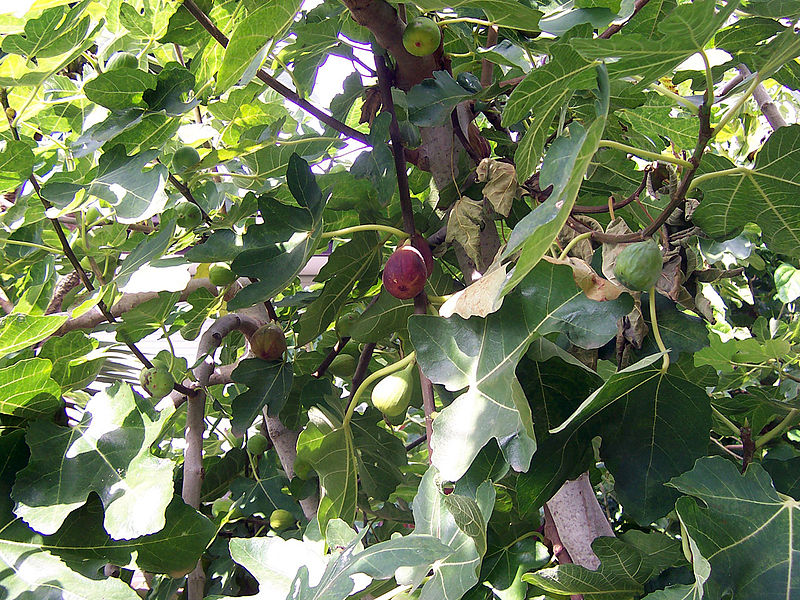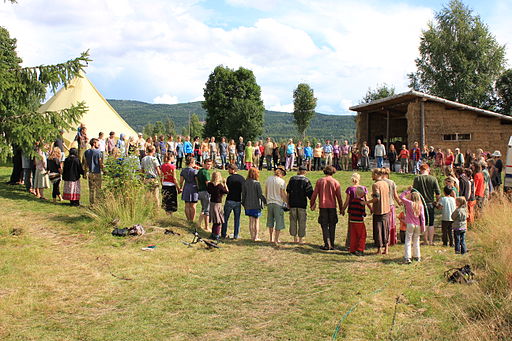After an unusually cold winter, the chances for such an amazingly balmy day in early March would seem slim at best. But on March 2, the South Carolina Upstate Permaculture Society met outside under the pecans and sunshine beside the Swamp Rabbit Cafe and Grocery for an electric exchange with some of the area's most accomplished experts. And winter got a swift kick in the pants.
Our question and answer panel consisted of Shawn Jadrnicek, manager at the Clemson Student Organic Farm, Nat Bradford of Eco Art, LLC, Eliza Lord of Appalachian Feet, Tradd Cotter of Mushroom Mountain, Joshua Runion of North American Rain Systems, Dylan Ryals-Hamilton of Permaculture in Action, Rebecca Mckinney of South Carolina Organization for Organic Living and Chad Manaton of Suburban Sharecrop. Nathaniel Lord emcee'd, bringing the pre-event survey questions to the panel and moderating all the side shoots that sprouted from them.
There is not room within the ordinary boundaries of sane blog post lengths to include all the content covered at this illuminating affair, but here are some of the highlights, followed by summaries and interpretations of the panelists' responses.
Question: Does anyone factor in Return on Investment (ROI) when doing permaculture projects?
 |
Tradd- The world through the eyes of a mycologist.... Just about any organic material is considered fair game for mushroom cultivation, so keep on the lookout for discarded materials that can be turned to treasure. Also, with any new venture, Tradd says to start small and then grow with your level of expertise.
Nat- Establish long term relationships with customers by committing to long term stewardship rather than short term solutions. For instance, practicing succession plantings on degraded landscapes can replace the endless cycle of re-mulching to prevent erosion, thus saving the customer from needing to rehire this service and providing long term job security for the landscaper.
Dylan- There is no price tag on sustainability. But bio-solutions are also the most economical. (The earth is the bank of all banks, because all of our endeavors are dependent upon its renewable resources.)
Discussion: Keeping resources on site, water harvesting and purification.
Joshua- The biological water cycle is the perfect system. When we disrupt that system by placing buildings and lots, etc., over the ground and letting this wash into our waterways, we lose a valuable resource and make this water unusable through pollution. Re-engineering human constructed sites so that water is collected, purified and returned to the biological cycle after many uses is the purpose of Joshua's rainwater collection supply business, and, I might add, one of permaculture's prime directives.
Chad- When pollution is a concern, such as for use in his aquaponics system, rainwater is a much better source than city water, which he has had to treat in order for it not to poison his fish.
Dylan- For water purification, install first flush systems when collecting roof water. (A first flush diverter will fill up with the initial, polluted rainwater, then overflow into the rest of the rainwater harvesting system)

Shawn- After every millimeter of rainfall, surface pollution is cut in half. So by calculating the amount of water collected by a roof during the course of 1 millimeter of rainfall, you can calculate how much space you will need for a first flush diversion and reduce the percentage of remaining contaminants.
Tradd- Use mycoremediation to take care of that first flush water by directing it into a fungal garden, and then perhaps through a bog garden before it enters the rest of the site. Experimentation needs to be done to figure out the size of these fungal gardens so that the water stays long enough for the fungi to break down pollutants.
Nat- Use a multi-layered process to harvest rainwater and direct it through the landscape.
Exciting Projects:
Chad- A black soldier fly harvesting project is in the works, plus using cattle panels on the farm as a trellis to grow loofahs, providing shade for summer lettuce in the process, then using them to serve as a frame for plastic to extend the season into the cooler months.
Rebecca- Testing various microclimates for growing ginger and turmeric is the next experiment for Rebecca's garden (now that she has her famous Frankenbeds in place). After accidentally leaving some roots in the dappled shade of a dogwood, she realized that these may make good woodland edge crops.
Dylan- Permaculture in Action is planning some awesome, condensed mini workshops to add to their repertoire. Dylan is also involved in Transition Asheville and wants to continue to promote networking for community regeneration.
Joshua- Currently, most of his business provides for out of state clients. Joshua is hoping to be able to bring whole house rainwater collection to the Upstate.
Tradd- We are eagerly awaiting the publication of Tradd's book on organic mushroom cultivation and mycoremediation. He is working towards offsetting energy in the mushroom growing room with solar panels and plants to help regulate carbon dioxide levels. Mycoremediating black water and providing clean, cholera free water for people in Haiti are also on his to do list. (We may as well add rescuing runaway trains, hurling missiles harmlessly into deep space and saving kittens to that agenda.)
Eliza- Hooray for permaculture community! Eliza's efforts in forming SCUPS and mobilizing our community into a maverick, mutually aiding, food growing family of friends through permablitzes and similar strategies is what she is most excited about. And what could be more exciting than to start a tidal wave of permaculture throughout the Upstate!

Nat- As heir to the Bradford family watermelon, third oldest heirloom watermelon in the country, which was once thought to be extinct, Nat is celebrating its resurrection by using the profits to bring clean water and fresh fruit to impoverished communities through his nonprofit, Watermelons for Water.
Shawn- Grafting tasty Asian persimmons onto american rootstocks, setting up a greenhouse and continued improvements at the Clemson Student Organic Farm are some of the cool things Shawn has cooking. Oh, and we hear a book with Chelsea Green publishers is also in the oven. Or maybe in the mixing bowl. But it's coming!
Read more about upcoming SCUPS events and other announcements from our March newsletter!


Sara, thanks for posting this. I found the session quite informative. Personally I'm waiting for Tradd's fungus that kills fire ants to become commercially available!
ReplyDelete